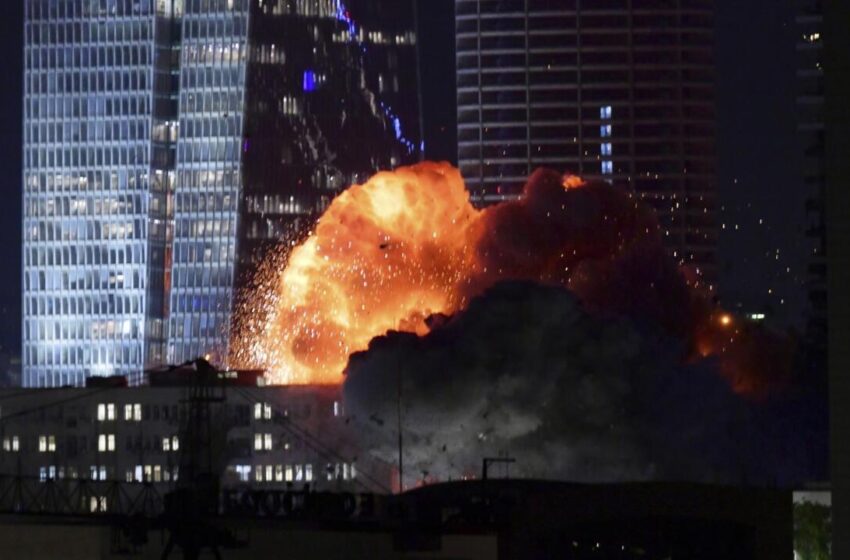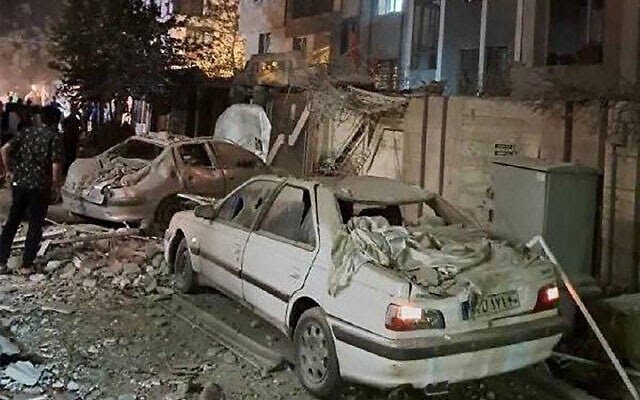From Tehran to Tel Aviv: Iran launches retaliatory assault on Israel

Photo of Iran’s missile strike on Israel’s capital city Tel Aviv. Photo Credit- Reuters
Iran conducted a large-scale ballistic missile attack on Israel late Friday night, June 13, 2025, in retaliation for recent Israeli strikes on Iranian territory, including nuclear and military sites. The assault, which began shortly after midnight local time, has heightened fears of a broader regional conflict.
The Israeli military confirmed that Iran launched approximately 200 ballistic missiles targeting key locations across the country, including Tel Aviv and the Golan Heights, as part of an operation codenamed “Operation True Promise III.” Explosions were reported in several areas, with sirens sounding across Israel as the attack unfolded. The Israeli Defense Forces (IDF) reported that its advanced air defense systems, including the Iron Dome, intercepted a significant number of the incoming missiles, though some evaded defenses, causing damage.
Initial reports from Magen David Adom, Israel’s national emergency medical service, indicate that at least three people were killed, and dozens more were injured, including 21 treated after a rocket strike hit a residential area on the coastal plain. Images circulating on social media showed damaged homes and disrupted infrastructure, particularly in Tel Aviv, where the annual Pride parade was canceled amid the chaos.
RELATED STORIES
Israel strikes Iran’s nuclear facilities, military leaders in bold assault
Timeline: Iran, Israel’s war… how it all started
The strikes mark Iran’s third direct attack on Israel since the ongoing Iran-Israel conflict intensified in 2024, following similar assaults in April and October of that year. This latest escalation follows Israel’s preemptive strike, dubbed “Operation Rising Lion,” launched earlier this week against Iran’s nuclear facilities and military infrastructure. The IDF confirmed the killing of Hossein Salami, Commander-in-Chief of Iran’s Islamic Revolutionary Guard Corps (IRGC), during the operation, a move likely to provoke further retaliation.
Iranian state media justified the missile attack as a legitimate act of self-defense, claiming it targeted only military and security sites responsible for what they describe as Israeli “genocide” in the region. Iran’s Foreign Minister issued a statement asserting that the strikes were a response to months of Israeli aggression, including attacks on Iranian soil and support for conflicts in Gaza, Lebanon, Syria, and Yemen.
The United States has remained cautious in its response, with a senior official telling The Washington Post that any decision to assist Israel with defensive strikes, such as shooting down Iranian missiles, rests with President Donald Trump. Meanwhile, former US Ambassador to the UN Nikki Haley praised Israel’s “decisive action” against Iran’s nuclear capabilities, signaling potential international support.
Israeli airspace has been closed, with national carrier El Al suspending all flights due to the ongoing security situation. The conflict has also disrupted civilian life, with schools and businesses shuttered in affected areas. International leaders, including the United Nations, have called for de-escalation, warning that the exchange risks spiraling into a full-blown regional war.
Currently , the situation remains fluid, with both sides on high alert. Further updates are expected as the IDF assesses the damage and prepares its next steps, while Iran has signaled readiness for additional retaliatory measures.




